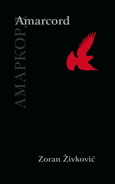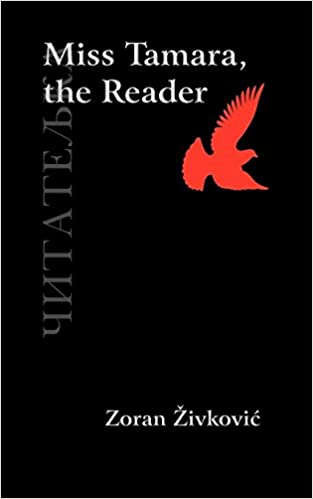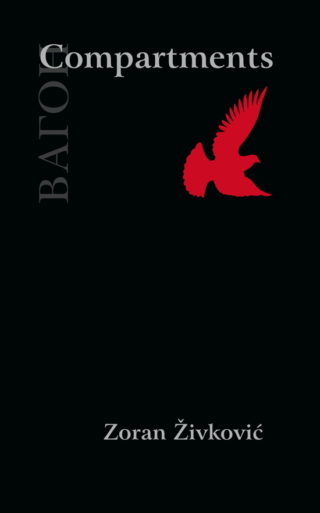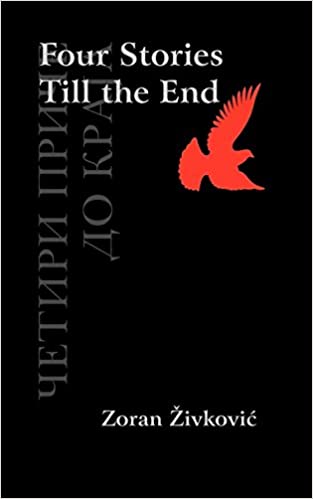 Here’s an odd pairing: Kurodahan Press, an independent publisher specializing in English translations of Japanese literature (including the essential LAIRS OF THE HIDDEN GODS and KAIKI horror anthologies) and the quintessentially European author Zoran Zivkovic, arguably the most consistently brilliant purveyor of modern surreal fiction. But odd pairing or not, Kurodahan’s Zoran Zivkovic publications are nifty, being strikingly crafted and eye-pleasing, not to mention affordable and user friendly in design and layout.
Here’s an odd pairing: Kurodahan Press, an independent publisher specializing in English translations of Japanese literature (including the essential LAIRS OF THE HIDDEN GODS and KAIKI horror anthologies) and the quintessentially European author Zoran Zivkovic, arguably the most consistently brilliant purveyor of modern surreal fiction. But odd pairing or not, Kurodahan’s Zoran Zivkovic publications are nifty, being strikingly crafted and eye-pleasing, not to mention affordable and user friendly in design and layout.
Having spent much of the past year engaged in something of a crash course in Zivkovic’s fiction, I can attest that the five Zivkovic titles put out by Kurodahan in 2010 are very representative. All are collections, a form Zivkovic especially favors, and all were translated from the Serbian by Zivkovic’s frequent English translator Alice Copple-Tošić.
The stories of these books take place in undefined contemporary settings, where (mostly) nameless protagonists engage in various odd doings. Thematically interlinked anthologies are a Zivkovic trademark, with stories that complement and even complete one another in various arcane ways. The books under discussion are all quite short, with unerringly focused and easy-to-read prose, but don’t be fooled: Zivkovic’s fiction is among the most thoughtful and complex of any author.
What follows are brief summaries of Zoran Zivkovic’s five Kurodahan Press titles, all of which are worth your time. For the benefit of both the Zivkovic novice and the more seasoned fan, I’ve arranged them numerically in order of least to most bizarre, starting with…
 1. THE LIBRARY
1. THE LIBRARY
A fast, easy read: a collection of six stories centered on books and their (mostly adverse) effects on various lonely, solitary individuals. A writer discovers a website claiming to have every book ever written available for download, a man finds a succession of thick books turning up in his mailbox, another is trapped inside a library containing books of people’s lives and another in a “reformed” hell, which has been fashioned into a giant library as both punishment (because so few people read) and therapy to the inferno’s denizens. In the final tale a snooty collector discovers a paperback in his cherished hardcover collection and attempts to expel the offending book—which, it turns out, is the very book under review here.
2. AMARCORD
This one is slightly more complex in its design. It features ten stories, each named after a famous work of literature (“The Magic  Mountain,” “The Book of Laughter and Forgetting,” “Fahrenheit 451,” etc), and all centered on themes of memory. In the first story a nameless man finds his memory has been artificially removed due to some unspecified crime he committed, while in the last story another nameless man (the same one?) learns a far more momentous truth about himself and his memories. There’s also an antique shop where one can buy others’ memories, a doctor who discovers an amnesiac’s “backup memory,” a machine that retrieves deceased people’s past experiences from DNA stored in their body parts, “memory agencies” that purchase especially exciting and dramatic memories, a man who suffers from “double memories” and another who can recall various different timelines of any single event. A fun and endlessly provocative little book.
Mountain,” “The Book of Laughter and Forgetting,” “Fahrenheit 451,” etc), and all centered on themes of memory. In the first story a nameless man finds his memory has been artificially removed due to some unspecified crime he committed, while in the last story another nameless man (the same one?) learns a far more momentous truth about himself and his memories. There’s also an antique shop where one can buy others’ memories, a doctor who discovers an amnesiac’s “backup memory,” a machine that retrieves deceased people’s past experiences from DNA stored in their body parts, “memory agencies” that purchase especially exciting and dramatic memories, a man who suffers from “double memories” and another who can recall various different timelines of any single event. A fun and endlessly provocative little book.
 3. MISS TAMARA, THE READER
3. MISS TAMARA, THE READER
As in THE LIBRARY, this beguiling collection attests to Zivkovic’s all-encompassing love affair with the printed word. Here the stories, all centered on a compulsive reader identified only as Miss Tamara, are linked by repeated actions and some very pointed symbolism, specifically different types of fruit. Each story is named after a particular fruit that figures in it—“Apples,” “Lemons,” “Bananas” and eventually “Fruit Salad.” Among other oddities, Miss Tamara is lured to various locations by a series of postcards she finds in library books, roped into reading a chapter of a book to a blind man in a park, given new reading glasses that cause the words in her books to gradually disappear as she reads them, and becomes obsessed with deciding the last book she’ll read before she dies.
4. COMPARTMENTS
This six story mind-boggler is short and straightforward yet contains enough manic invention to fill a sci fi trilogy. The title piece is a  novella-length exercise in dreamlike frission, with a hapless man led into a succession of increasingly odd encounters with several highly eccentric individuals on a train. “The Square” achieves an equivalent level of imaginative bizarre, with four workaholic protagonists undergoing similar experiences that draw them into a town square, where a certain ecstatic transcendence is in store. A further standout is “The Teashop,” which like “Compartments” involves a fateful train ride—in this case, though, the protagonist, an inquisitive young woman, begins the tale by disembarking from a train. She enters a teashop and, upon ordering a “Tea Made of Stories,” gets quite an earful. Rounding out the collection are “The Telephone,” about a man who receives a series of suspicious phone calls by someone claiming to be Satan, and “First Photograph,” whose narrator attempts to explain a photograph of himself as an infant with his ear intently pressed against his mother’s stomach; apparently he was listening for the heartbeat of his unborn twin brother, who chose to shrink himself down to quantum size rather than be born.
novella-length exercise in dreamlike frission, with a hapless man led into a succession of increasingly odd encounters with several highly eccentric individuals on a train. “The Square” achieves an equivalent level of imaginative bizarre, with four workaholic protagonists undergoing similar experiences that draw them into a town square, where a certain ecstatic transcendence is in store. A further standout is “The Teashop,” which like “Compartments” involves a fateful train ride—in this case, though, the protagonist, an inquisitive young woman, begins the tale by disembarking from a train. She enters a teashop and, upon ordering a “Tea Made of Stories,” gets quite an earful. Rounding out the collection are “The Telephone,” about a man who receives a series of suspicious phone calls by someone claiming to be Satan, and “First Photograph,” whose narrator attempts to explain a photograph of himself as an infant with his ear intently pressed against his mother’s stomach; apparently he was listening for the heartbeat of his unborn twin brother, who chose to shrink himself down to quantum size rather than be born.
 5. FOUR STORIES TILL THE END
5. FOUR STORIES TILL THE END
One of Zivkovic’s absolute strangest books, a veritable mini-epic of interconnected surreality as weird as anything he—or anyone else—has ever written. In the first story a condemned man receives visits in his cell from four unexpected individuals: his lawyer, his prosecutor, his judge and a prison guard, all of whom have bizarre stories to tell that involve artistry and death. The following three tales likewise feature nameless protagonists confined to various claustrophobic settings—a hospital room, a hotel room and an elevator—where they’re each visited by four people, all of whom have bizarre stories to tell involving artistry and death. Those stories are showcases for Zivkovic’s consistently oulandish sense of invention, in accounts of a missionary vanishing into a painting; a circus usher determined to kill every spectator whose name has at least two vowels by placing dangerous insects on tickets; a hotel containing a zinc mine, slaughterhouse and cemetery; an elevator dining room; a serial killer who atones for his sins by painstakingly cutting out letters from books, with which he then creates “literature preserves.” Wow.
